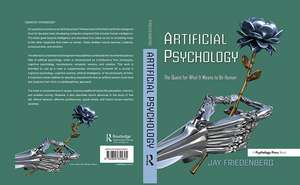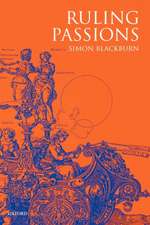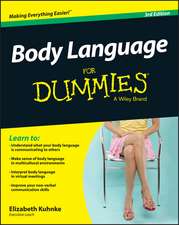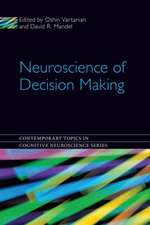Artificial Psychology: The Quest for What It Means to Be Human
Autor Jay Friedenbergen Limba Engleză Hardback – 17 mar 2008
The attempt to understand and engineer these abilities constitutes the new interdisciplinary field of artificial psychology, which is characterized by contributions from philosophy, cognitive psychology, neuroscience, computer science, and robotics. This work is intended for use as a main or supplementary introductory textbook for a course in cognitive psychology, cognitive science, artificial intelligence, or the philosophy of mind. It examines human abilities as operating requirements that an artificial person must have and analyzes them from a multidisciplinary approach.
The book is comprehensive in scope, covering traditional topics like perception, memory, and problem solving. However, it also describes recent advances in the study of free will, ethical behavior, affective architectures, social robots, and hybrid human-machine societies.
Preț: 935.29 lei
Preț vechi: 1255.89 lei
-26% Nou
Puncte Express: 1403
Preț estimativ în valută:
178.97€ • 184.63$ • 149.35£
178.97€ • 184.63$ • 149.35£
Carte tipărită la comandă
Livrare economică 26 martie-09 aprilie
Preluare comenzi: 021 569.72.76
Specificații
ISBN-13: 9780805855845
ISBN-10: 080585584X
Pagini: 312
Ilustrații: 13 halftones and 54 line drawings
Dimensiuni: 187 x 235 x 24 mm
Greutate: 0.68 kg
Ediția:New.
Editura: Taylor & Francis
Colecția Psychology Press
Locul publicării:Oxford, United Kingdom
ISBN-10: 080585584X
Pagini: 312
Ilustrații: 13 halftones and 54 line drawings
Dimensiuni: 187 x 235 x 24 mm
Greutate: 0.68 kg
Ediția:New.
Editura: Taylor & Francis
Colecția Psychology Press
Locul publicării:Oxford, United Kingdom
Cuprins
Introduction. Brain and Mind. Perception and Action. Learning and Memory. Thinking. Language. Intelligence. Creativity. Free Will and Decision Making. Consciousness. Motivation and Emotion. Biology. Social Behavior. Conclusion.













